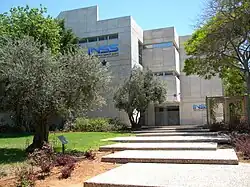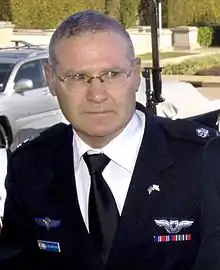Institute for National Security Studies (Israel)
The Institute for National Security Studies (INSS) is an independent[1] think tank affiliated with Tel Aviv University in Israel that conducts research and analysis of national security matters such as military and strategic affairs, terrorism and low intensity conflict, military balance in the Middle East, and cyber warfare.[2]
.jpg.webp)  INSS campus at Tel Aviv University | |
| Formation | 1977 |
|---|---|
| Location |
|
Executive Director | Manuel Trajtenberg |
| Website | www |
Formerly called | Jaffe Center |
It is considered Israel's leading security think tank[3][4][5] and one of the top defense and national security think tanks in the world.
History

INSS was founded as the Center for Strategic Studies in 1977 by General (ret.) Aharon Yariv, former IDF Military Intelligence Chief, as "Israel's first public forum for debating strategic and military affairs".[5] The Center served as a pioneer in redefining the field of Israeli security studies and producing research in the fields of defense and national security that began being used by academic and policy makers.
In 1983, the Center changed its name to the Jaffee Center for Strategic Studies, following a donation from Melvin Jaffee of California. In October 2006, the Jaffee Center changed its name to the Institute for National Security Studies, after INSS was officially granted independence from the Tel Aviv University and became an affiliate. Additionally, the contribution from Frank Lowy, INSS transferred to a renovated building near Tel Aviv University on Haim Levanon Street 40, Tel Aviv.
Until 2021, the INSS was led by Major General (ret.) Amos Yadlin, when Manuel Trajtenberg, the former head of the National Economic Council and Member of Knesset for the Zionist Union party, took over leadership.[6]
INSS research is published worldwide including in books, academic articles, news media, and used by government officials. INSS holds seminars and conferences in various fields of strategic affairs such as the annual Defensive Cyber Intelligence Security conference and Aerial Threat Seminar. Additionally, INSS publishes peer-reviewed journals, such as Military and Strategic Affairs.
Reception
In the University of Pennsylvania's Global Go To Think Tanks Report, INSS was ranked as the best think tank in the Middle East and North Africa in 2019 and 2020.[7][8] It ranked as the 12th best defense and national security think tank, and the 48th best non-U.S think tank in the world.[8] The institute's study "The History of Israeli–Palestinian Negotiations" was among the list of "Best Policy Study/Report Produced by a Think Tank" for the 2013–2014 term.[9]
Chechic Award
The Chechic Award is given annually for the most outstanding research in security studies.[10]
See also
References
- Israel ponders border security, enlarged military amid Egypt unrest
- EuroMesCo
- Tobin, Andrew (2017-01-03). "Israel's top security experts redraw West Bank map for the Trump era". Jewish Telegraphic Agency. Retrieved 5 October 2023.
Israel's leading security think tank
- Sokol, Sam (2023-07-23). "Leading Security Think Tank Says Israel in 'Most Severe' Crisis, Calls to Halt Legislation". Haaretz. Retrieved 5 October 2023.
one of the country's leading security think tanks
- Khalidi, Ahmad Samih (Spring 2017). "Strategic Survey for Israel, 2016-2017". Journal of Palestine Studies. 46 (3): 75. Retrieved 5 October 2023.
one of Israel's foremost strategic studies centers
- Jerusalem Post Staff (March 1, 2021). "INSS: Prof. Manuel Trajtenberg to replace Amos Yadlin as director". Jerusalem Post. Retrieved 10 January 2023.
- https://repository.upenn.edu/cgi/viewcontent.cgi?article=1018&context=think_tanks/
- McGann, James (2021-01-28). "2020 Global Go To Think Tank Index Report" (PDF). Think Tanks and Civil Societies Program. University of Pennsylvania. Retrieved 5 October 2023.
- "The 2014 Global Go To Think Tank Index". University of Pennsylvania. 2015-02-04. Retrieved 2015-02-14.
- "Amos Harel". Tel Aviv University. Archived from the original on 13 December 2014. Retrieved 10 December 2014.